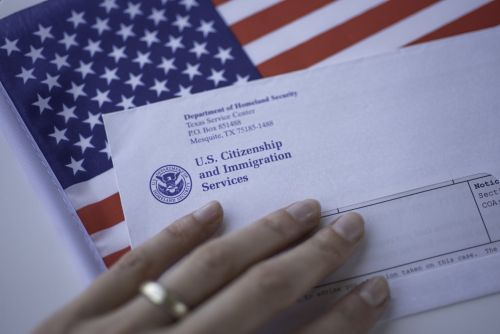Menu
Trump Administration Imposing New Fines on Noncitizens
Contributor: Van T. Doan

As of June 27, 2025, the Trump administration has put in place a new system that allows immigration officers to fine undocumented immigrants large amounts of money if they were previously ordered to leave the United States, but remained for over 30 days. In some cases, these penalties can amount to millions of dollars. Noncitizens will be sent letters from individual Department of Homeland Security (DHS) officers notifying them that the fines have been imposed; if they fail to respond within 15 business days, they lose any right to appeal.
Are These Fines Legal?
It has been legal for decades for the United States to fine immigrants who don’t leave the country after being told to do so. In 1996, Congress passed a law authorizing a fine of $500 per day in this situation. However, the law was rarely used for decades; the government was more focused on actually removing undocumented immigrants, and most people who were fined didn’t have the means to pay.
Now, the fines that can be imposed are $998 per day (the original amount, adjusted for inflation). That adds up quickly, to about $364,270 per year. Obviously, most immigrants are still unable to pay those large sums, but the administration has decided to impose the fines anyway.
What Has Changed About How Fines are Imposed?
In the past, to the extent these fines were imposed on noncitizens who stayed in the country after being told to leave, the process was different. Previously, immigration officers had to warn people first, either in person or by certified mail, of an intent to fine. Immigrants then had 30 days in which to challenge the fine, and could request a hearing and an appeal to an independent immigration appeals board.
Under the new Trump procedures, immigration officers can just send a letter imposing the fine directly to the immigrant, with no warning notice. The window to challenge the fine has been cut in half to fifteen days. Notably, an appeal of a fine goes only to another immigration officer—not to an independent court or board. Furthermore, there is no chance for an in-person hearing, as there was previously. And there is no recourse for immigrants who miss their window to challenge the fines. In short, noncitizens may be facing not only exorbitant fines well beyond their ability to pay, but have less due process than ever before.
Why Is the Government Doing This Now?
Government officials say that the system that was previously in place for these fines offered immigrants too many due process protections, making it impossible to impose these fees at the scale that Congress had authorized. With modern databases, it is easier to determine which immigrants may be subject to fees, and therefore to implement those fees.
What Happens Next?
There are currently at least 1.4 million people in the United States with a final order of removal. DHS could conceivably impose fines on any of them, many of whom have removal (deportation) orders that are years old. In many cases, these immigrants may be unaware of the removal orders because notice of a court date went to the wrong address, or the immigrant was a minor at the time the removal order was issued. Fines would begin to accrue not from the date of a current notice, but from the date of the immigrant’s failure to leave the country as directed. That means that many people with older orders of removal may soon face not only deportation, but crushing financial penalties.
It is virtually certain that there will be legal challenges to these new procedures, but in the meantime, that is little comfort to people who have already begun to be fined. A woman originally from Honduras who lives in South Florida has been in the United States for more than two decades; her three children are U.S. citizens. But she received a removal order in 2005, and since she did not leave the country at that time, she has now been fined more than $1.82 million dollars and faces deportation
Even if immigrants who have been fined manage to stay in the United States, debt from the fines is likely to stay with them. Certain debt, including fines payable to the government, is nondischargeable in bankruptcy. It is very likely that these fines would fall into the category of debts that cannot be discharged.
What Should I Do if I Receive Notice That I am Being Fined?
If you receive notification of a fine, do not ignore it! You have an incredibly short window to challenge the fine, after which you lose the opportunity forever. You should immediately contact an experienced immigration attorney to review your options and get help to challenge immigration fines while that is still possible. To learn more, contact our law office.
